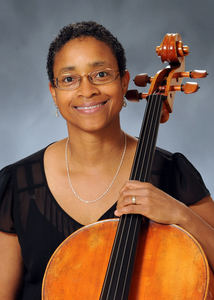

Cherylonda Fitzgerald began playing cello in middle school after hearing a string quartet play Mozart.
Unlike her male counterparts in this article, Cherylonda Fitzgerald says her identity as a black woman "has not been a huge factor in my life. I am color blind when it comes to interacting with people and making decisions. As far as music is concerned, most of the music I perform is classical, so I rarely get the opportunity to perform music by black composers, although it does exist. I also rarely get the opportunity to perform with other black musicians. I read somewhere that the percentage of black musicians in U.S orchestras is less than three percent. It's not unusual for me to be the only black woman on stage and sometimes in the entire hall. So I relate to my colleagues and audience through a shared love of music, not through a shared cultural heritage. I hope that my success as a black female musician inspires young black students to excel in whatever they are passionate about."
A native of Louisville, Ky., Fitzgerald moved to the Tri-Cities area in 2003 by way of San Francisco, Calif., where she had a career as a digital graphic production artist.
She started playing cello in middle school after hearing a string quartet play Mozart. "They were recruiting for the school orchestra," she recalls. "I had never heard of a cello, but I thought it would be fun to play such a big instrument. Plus, it looked easier to play than the violin. Boy, was I ever wrong about that! It is just as challenging - sometimes even more so! I quickly fell in love with the sound, and I am thankful that I chose the right instrument for me." Her orchestra teacher, who happened to be a cellist herself, encouraged her to take private lessons. After playing in the school orchestra for about a year, she joined the local youth orchestra and attended summer music camps.
"My primary musical influences are my former cello teachers who were all very positive, kind, patient, nurturing people - Patricia Brannon, Louise Harris, Susannah Onwood and Timothy Eddy," she says. "I was, of course, in awe of the great cellists performing at that time: Janos Starker, Mistislav Rostropovich, Yo-Yo Ma, and others. My current musical influences are too numerous to list. I am inspired by a wide variety of musicians and am constantly working towards improving my technique and teaching skills by observing other cellists through workshops and seminars and Internet resources."
Fitzgerald is a founding member of The Paramount Chamber Players (TPCP), an ensemble that provides performance opportunities for chamber artists and young musicians in the Tri-Cities area. The ensemble presents programs of multicultural classical and jazz repertoire, including new music by local composers, with many works composed especially for the group.
"About seven years ago," she recalls, "pianist Craig Combs approached me with an idea. He is a native of Bristol and was seeking local musicians interested in performing chamber music regularly. I immediately said, "Count me in!' At that time, the small chamber music groups I participated in were put together as needed for specific individual events. Often you wouldn't know whom you would be playing with until you got to the first and only rehearsal. It's nice to play with a variety of people, but it's a very different experience from playing with the same group of musicians over a long period of time. The Paramount Chamber Players has since grown to a group of about 10 members doing about nine performances a year. Our rehearsals are extensive and intense. The amount of time we spend working together has enabled us to develop a close relationship and create a more satisfying musical experience of a higher quality."
Fitzgerald also plays with groups such as the Johnson City Symphony, Symphony of the Mountains, Asheville Symphony, East Tennessee Baroque Consort, and Signature Strings.
"It's difficult for a classical musician to make a living in any economy, and the current economic climate affects every aspect of my profession," she says. "When funding is cut, orchestras have to reduce the number of musicians they use; schools cancel music programs; parents can't afford to give their children lessons or buy them instruments; recorded music is used instead of live musicians, etc. Musicians everywhere are indebted to the generous supporters who make it possible for us to share our talents."
She continues, "Many people don't realize that ticket sales actually cover only a small part of the budget. The rest comes from philanthropic support in the form of grants, corporate sponsors and donations. Due to tough economic times, many corporate donors have disappeared, so musical organizations have to look hard for income from other resources. Some are less successful than others. Just this year the orchestras in Philadelphia, Syracuse and Louisville had to declare bankruptcy.
"The orchestras that I perform with have not folded, but they have had to cut back on the number of musicians used for many concerts. The audience misses out because programming starts to be based not on what they want to hear, but on what the orchestra can afford to play. The ability to bring in guest artists is limited by budget considerations as well."
Fitzgerald teaches cello privately and is adjunct instructor of cello/bass and chamber music at Milligan College and East Tennessee State University. She received her Bachelor of Music in Cello Performance and Music Education from the University of Louisville and her Master of Music in Cello Performance from S.U.N.Y. at Stony Brook, N.Y.
BACK TO THE MAIN STORY:
Sammie Nicely: Artwork Inspired by African Heritage